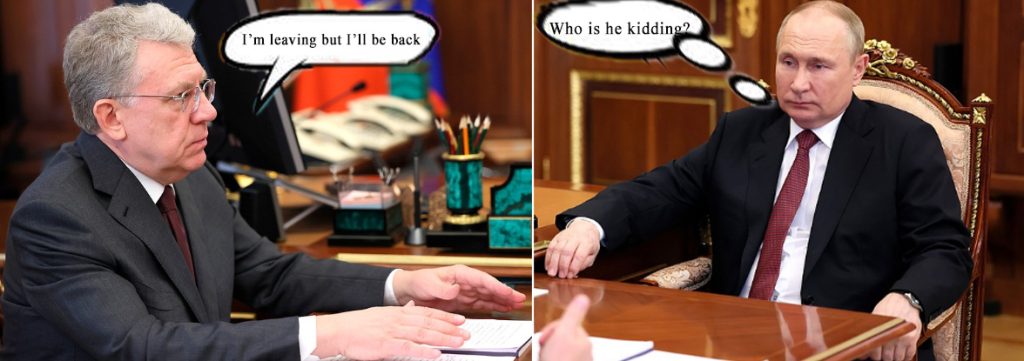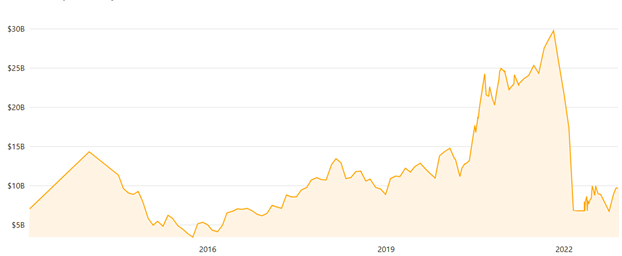

By John Helmer, Moscow
@bears_with
There were only two ways for Alexei Kudrin to become the president of Russia that he and the US government have always wanted.
The first was for him to become prime minister first, and for him to get the job through the back door, exactly as Vladimir Putin got it from Boris Yeltsin. The second was for him to take the job by a US-backed, regime-changing plot as Yeltsin ousted Mikhail Gorbachev.
However, after repeated attempts at the back-door option over the past decade have failed, Kudrin has come up with the second way. Last week, in a secret meeting with Putin, it was agreed Kudrin would leave his official post as Accounting Chamber chairman and become the nominal head of the Yandex group’s restructuring into a combination of state-controlled internet operations and offshore commercial businesses controlled by the group’s founding oligarch and Israel exile, Arkady Volozh.
In this second role Kudrin will be paid a very large sum of money for himself – between $335 million and $1 billion, depending on the terms of his deal with Volozh. Also, he will be free to bank large donations from wellwishers, all of whom aim to defeat Russia in the present war and replace Putin in the Kremlin.
The terms of Putin’s agreement with Kudrin include approval for a new form of control over the most powerful media and internet platform in the country for influencing domestic political campaigns for the foreseeable future.
The Kremlin has not disclosed last week’s meeting, but on November 29 it sent an official notice of Kudrin’s exit to the Federation Council. Kudrin has published by Telegram this explanation of what he is doing. “In total, I have spent about 25 years in the public sector. Now I would like to focus on large projects that are related to the development of private initiatives in a broad sense, but at the same time have a significant effect on people. Therefore, I am leaving the post of Chairman of the Accounts Chamber, and I have submitted a corresponding application to the President of the Russian Federation in accordance with the established procedure.”
No one in Russia believes that by “significant effect on people” Kudrin means to be kindlier than his rival for US sponsorship for the Kremlin job, Alexei Navalny. In all of Navalny’s years of exposing oligarch and official corruption in Russia, Kudrin has never been targeted or criticized. He has reciprocated the favour towards Navalny.
Mikhail Delyagin, the influential economist and Duma deputy, has restricted himself to observing that at the Accounting Chamber Kudrin was no more than “an accountant who protected state corruption.” “Kudrin made the work of the Accounting Chamber more systematic, more client-oriented for other branches of government. It has been the most comfortable body for interaction inside public administration [and] has never been an influential body. If the state considers corruption as a direct threat to its existence, then the Accounting Chamber will receive the order to investigate it. So far there have been no such signs.” Delyagin is unready to say what he thinks on the Yandex appointment.
Kudrin’s opponents in domestic politics don’t doubt that in leaving the Accounting Chamber for Yandex, Kudrin is not exiting from the country nor retiring from Russian politics. Instead, as Sergei Stankevich, the veteran opponent of Yeltsin, told Tsargrad yesterday: “the Accounting Chamber was a politically neutral position. In the large IT corporation [Kudrin] will have more opportunities to influence political processes. And he will have more freedom in formulating his views in the public sphere. So he’s not leaving politics; instead, he’s making his comeback.”
So far not a single newspaper, television talk show, social media platform, or Duma deputy has asked why the President has agreed, and what Putin’s plan is for Yandex and for Kudrin.
In 2024 when Putin runs for re-election, he will be 72 years old; in 2030 when that term ends, he will be 78. Kudrin is 62 now; 64 in 2024; 70 in 2030. “That’s getting on in years for the new president of Russia,” a Moscow source comments. “But just right for the grey cardinal of the Kremlin, the kingmaker.”
The last time Putin and Kudrin met and talked on the record was June 14 of this year. The lead images are the official Kremlin photographs of that meeting. The official record of what they said can be followed here. There was no mention in the Kremlin communiqué of Volozh’s scheme for the reorganization of the Yandex assets and of his shareholding. Press and public leaks of the scheme have followed in opposition media, including The Bell and Meduza. They have been amplified by the US government’s propaganda organ RFE/RL and by the Japanese propaganda platform in London, Financial Times.
Follow the archive of Kudrin’s career as Anatoly Chubais’s protégé during the creation of the oligarch system in 1996; as deputy finance minister in charge of the state treasury and bank default of 1998; and as Putin’s protégé as finance minister, deputy prime minister and Accounting Chamber chairman until now.

“Alexei Kudrin is the longest-running candidate for regime change in the Kremlin who is not in jail, or outside the country” – March 18, 2019
For the Meduza version of Kudrin’s career, read this.
This is how Yandex has just reported to the US Securities and Exchange Commission (SEC) in Washington on its proposed reorganization between the offshore and Russian assets. According to the company, “the Board anticipates that Yandex N.V. will in due course be renamed, with the business to be divested retaining exclusive rights for the use of the Yandex brand. This process is at a preliminary stage. There can be no assurance that the Board will be successful in identifying and implementing paths to executing these steps, including identifying buyers for stakes in the business to be divested. These steps will be subject to continued analysis and, ultimately, shareholder approval. We will update the market as and when we have further information in this regard.”
Omitted is the scheme for Kudrin to negotiate for US and European Union (EU) approval to remove sanctions from the renamed offshore assets and preserve Volozh’s control, as well as his fortune and the contribution he will make to the political future Kudrin will be discussing in detail.
In The Bell’s version of the terms of the Yandex deal, leaked indirectly from Volozh and Kudrin, Volozh will exchange his 51.7% stake in old Yandex for full control of the offshore assets of new Yandex, while Kudrin will take a 5% shareholding of the Russian or offshore assets, or both. Estimates of what the asset split will be, what shareholders will remain to control the Russian assets, and what their market capitalization will amount to for calculation of Kudrin’s payoff have been leaked to The Bell.
The Kudrin payoff is so large it is is potentially the camouflage for the costs of his political comeback campaign between now and 2030.
Yandex shares have been listed on the NASDAQ exchange in New York since 2011. According to its last SEC filing of September 30, 2022, the Yandex shareholders were the Volozh Family Trust, with 45.1% voting control; other directors and management, 6.6%; other pre-IPO shareholders, 2%; and a free-float of 46.3%. How many of the reported free-floating investment fund shareholders are fronting for Volozh is unknown. All the shareholders have been subject since 2019 to Russian state control through a golden or priority share, which has passed through several legal variants.
YANDEX SHARE PRICE TRAJECTORY ON NASDAQ EXCHANGE FROM IPO IN 2011 TO EU SANCTIONS IN 2022

Source: https://finance.yahoo.com/
MARKET CAPITALIZATION OF YANDEX FROM 2011 TO THE PRESENT

To understand who controls the listed Yandex shareholdings, through what front companies, cutouts, and offshore evasion schemes, start with the IPO prospectus of 2011 here. The conversion of the Russian state’s golden or priority share into a Public Interest Foundation (PIF) share was reported in 2019 here. Volozh was sanctioned by the European Union in June 2022, but he is not sanctioned by the Office of Foreign Assets Control in Washington. This is the latest Yandex report of its shareholding structure as of September 30, 2022. Source: https://companiesmarketcap.com/
The company market cap as of November 25 was $6.7 billion.
Sergei Glazyev is one of the best-known economists to have opposed Kudrin in Russian policymaking. He is also the explicit critic of Central Bank chief, Elvira Nabiullina, and ally of Oleg Tsarev and Dmitry Rogozin in their campaigns to run the Novorussian regions. On his Telegram channel and website, Glazyev has not mentioned Kudrin, Yandex, or Volozh. He refuses direct requests for comment.

Left: Andrei Volozh with President Putin in 2017. Right: Sergei Glazyev.
The Communist Party and its deputies in the Duma have yet to publish their assessment of what is happening. The party spokesman would not answer on the telephone, and requested an email of the questions.
Moscow political analysts who are unsympathetic to Glazyev and to the war party are claiming that Putin wants Kudrin to become, according to Sergei Markov, his “channel for Putin’s negotiations with Western leaders…The Kremlin needs negotiations with the leaders of the Western economy. They want to end the conflict and come to peace.”
“Kudrin won’t go far from the state,” claims Alexei Makarkin from the Moscow think tank, Centre for Political Technologies.
“Kudrin will not go far from the state anyway,” according to Makarkin. “He will still be closely associated with it. So what will be the format for his relations with the state…let’s wait and see. There was the instance when Kudrin left the civil service, but still returned — and even when he left, he remained loyal to the state. No evidence of his departure is given now. And judging by how Kudrin recently met with the president, he continues to enjoy his trust… The Russian economists in power have a consensus on sound economic policy and on the non-admission of economists from the left. So those who are engaged in economic policy in Russia will remain. In order for the supporters of the mobilization economy [Glazyev, Delyagin] to have a future, some very serious shocks are needed so that they really get a chance to steer the ship. At the moment, such shocks cannot be expected.”











Leave a Reply